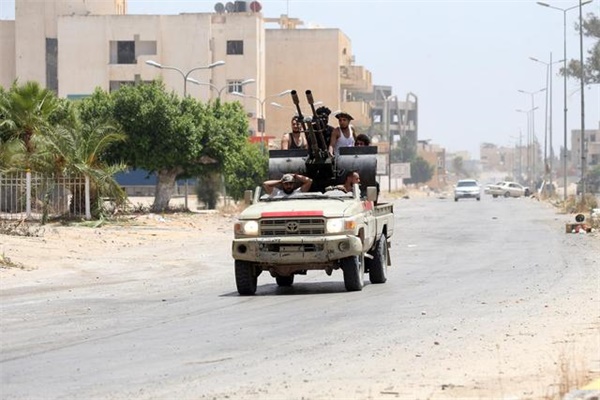
By Shao Yongling
According to reports, Libya’s Government of National Accord (GNA) rejected the peace initiative previously proposed by Egypt on June 8 and continued to chase the Libyan National Army (LNA) to the east with resistance encountered in Libya's northern port city of Sirte. On the same day, the United Arab Emirates and Russia expressed support for the peace initiative for Libya put forward by Egyptian President Abdel Fattah al-Sisi.
The new peace initiative includes a ceasefire between warring Libyan parties starting from June 8, a call for talks between Libya’s warring sides in Geneva, a UN-supervised election of a Libyan presidential council, and the disbanding of militias and the exit of foreign forces. This was proposed by Egypt at a critical moment in the civil war in Libya when the Libyan Army forces under Libya’s GNA had achieved a series of victories on the battlefield.
Egypt supports Haftar’s “Libyan National Army”. To sign the peace initiative mainly intends to ensure that Haftar’s forces could live tough conditions amid the current adverse situation on the battlefield and then hold peace talks to retain a position in Libya’s political landscape in the future. In this sense, this is a tactic also favorable for sustaining Egypt’s influence in Libya.
However, Libya’s GNA is occupying a more favorable position on the battlefield at present. With the support of Turkey this year, Libya’s GNA has performed more bravely on the battlefield and won a positive situation recently. On June 8, Libya’s GNA began to chase the LNA to the east and approached Sirte, 450 kilometers away from Tripoli (the capital city of Libya), former leader Muammar Gaddafi’s hometown, and a bridgehead to Libya’s oil-producing region. If Sirte could be broken through, the victory of Libya’s GNA is likely to be won in the civil war.
Under the current circumstances, accepting the peace initiative means that Libya’s GNA could no longer move forward, and its achievements made may also be harmed. What’s worse, there will be a place left for its opponent in Libya’s political landscape. Therefore, Libya’s GNA is reluctant to accept the initiative.
In the current situation when both parties have external forces to support and intervene, it will be very difficult for one party to achieve an overwhelming victory. With its control on oil-producing areas, the LAN has an advantage over the Libyan Army forces under Libya’s GNA in terms of resources and financial support, and its strength or potential cannot be underestimated. As for the Libyan Army forces under Libya’s GNA, it seems unsure whether it can maintain the current situation despite its advantageous position on the battlefield at present.
In general, Libya has been torn apart since the ouster and killing of former leader Muammar Gaddafi. Under such a split-up situation, it is almost impossible for one party to defeat the other by force, since both parties are close in strength, with external support, which expects to have their places in the political landscape of Libya. Therefore, I think that it is very difficult for Libyan Army forces under Libya’s GNA to unify the country, and the two parties may still need to sit down and negotiate to achieve peace by accepting the presence of the other party. In all, it is indeed difficult to win lasting peace by force alone in Libya under the current circumstances.
(Senior Colonel Shao Yongling is a professor who engages in international relations and military strategy research and has participated in a number of military and internal major scientific research topics. She is also a military commentator of CCTV and China National Radio. )
Disclaimer: This article is originally published on cnr.cn, and is translated from Chinese into English and edited by the China Military Online. The information, ideas or opinions appearing in this article do not necessarily reflect the views of eng.chinamil.com.cn.













